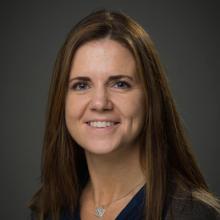Jane Gair
What are your main responsibilities or activities in your current position?
I teach Island Medical Program (IMP) UBC medical students in the first two years of their medical school training using the Case-Based Learning (CBL) method of teaching and learning. I train all of the IMP faculty to become CBL tutors and I am the CBL Site Lead for the IMP. I also teach and supervise medical students in the Flexible and Enhanced Learning (FLEX) courses in their first two years. As well, I am the Director of the Let's Talk Science Outreach Program located at UVic.
How does your current work relate to your graduate degree?
During my graduate program, I was a Teaching Assistant for a number of undergraduate and graduate courses. I taught in the UBC medical program as a Problem Based Learning (PBL) tutor and a Doctor, Patient and Society (DPAS) tutor as well. I also attended workshops on Instructional Skills, Presentation Skills and other workshops to help develop my teaching and public speaking. I became interested in faculty development and training of the PBL tutors, and volunteered to help with this aspect of the development of teachers in the UBC medical school. All of these things prepared me for the role I now have where I primarily teach and speak in public.
What do you like and what do you find challenging about your current position?
Being in a UBC program at UVic has its challenges, as we are not part of UVic in a substantial way. As well, I am located quite far from my home Department of Medical Genetics and the main UBC medical program, making it difficult to collaborate and interact meaningfully with my colleagues there.
Is your current career path as you originally intended?
I was never sure where I was headed when I started school, but very soon into graduate studies I knew that this was my goal.
What motivated you to pursue graduate work at UBC?
I am passionate about learning about genetics, and I knew that a graduate degree would train me in all of the ways that I thought would be helpful for gaining a career after graduation. I am passionate about science, curious, and wanted to learn as much as I could about higher education, genetics, writing, research, and communication skills.
What did you enjoy the most about your time as a graduate student at UBC?
All of the friends I made and spent time with during my graduate degree!
What key things did you do, or what attitudes or approaches did you have, that contributed to your success?
I made my PhD project very broad, I collaborated with many centres and people, I attended many events, talks, conferences, journal clubs and social activities, and I was involved in teaching and found some great mentors in those teachers.
What is your best piece of advice for current graduate students preparing for their future careers?
Take all of the opportunities that you can to develop yourself outside of your lab. Although it is very important, there are so many other skills that you can learn outside of that environment. Attend journal clubs, take on leadership positions, become a TA, expand your project so that you learn new and up and coming skills, network and attend conferences, and just get out there!
Did you have any breaks in your education?
I took a one year break right after my undergraduate degree on the advice of one of my genetics professors who I greatly admired. He suggested that it would be a good idea to gain some experience in a laboratory environment to determine if I really loved research before applying to graduate school. It was a smart decision and great advice! It gave me a much needed break, and allowed me to learn more and realize what graduate work would entail, so I was ready for it.
How did you find out about/obtain your current position?
As a result of doing my graduate work in the Faculty of Medicine, teaching in the medical school, and leading faculty development workshops as well, I heard about the expansion of the UBC medical program to the UVic and UNBC locations in Victoria and Prince George, respectively. I was in the end stage of writing up my thesis for my PhD and so I interviewed for the position at UVic for the IMP. My extensive teaching and faculty development experience, as well as my knowledge of the UBC medical program, gave me an edge and I was hired even before completion of my degree.
What challenges did you face in your graduate degree, or in launching your career?
The PhD program is challenging because it is long and there are few research PI positions out there for those who finish and want to pursue this. It can be discouraging and feel like it will never end, but I learned how to persevere, how to live in the moment, how to enjoy my time and not worry too much about the future, and I would not have done anything differently.
How are jobs normally posted and filled in your organization or industry?
Jobs are posted on the school's website and usually advertised widely via email to all members for distribution.
